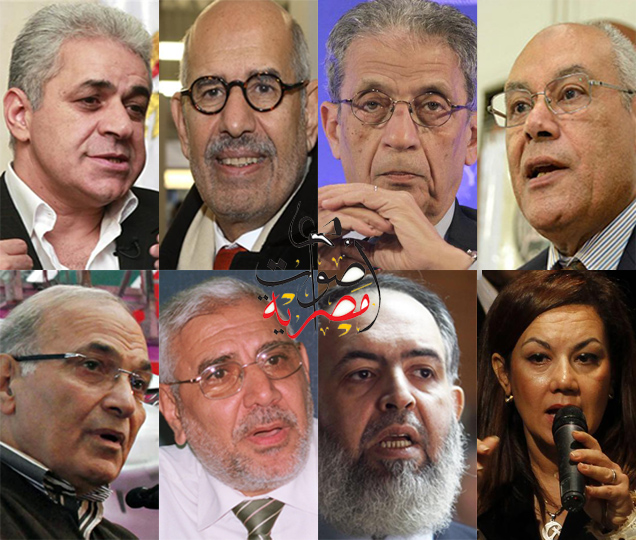Latest NEWS
- Aswat Masriya, the last word
- Roundup of Egypt's press headlines on March 15, 2017
- Roundup of Egypt's press headlines on March 14, 2017
- Former Egyptian President Hosni Mubarak to be released: lawyer
- Roundup of Egypt's press headlines on March 13, 2017
- Egypt's capital set to grow by half a million in 2017
- Egypt's wheat reserves to double with start of harvest -supply min
- Roundup of Egypt's press headlines on March 12, 2017
Muslim Brotherhood's quest for a presidential candidate

Presidential Candidates
Who will the Muslim Brotherhood and its political arm the Freedom and Justice Party support in the first presidential elections after the 25 January revolution, now that they have secured a majority in parliament? The question is particularly relevant in the light of the group commanding the best organised voting bloc in the country, yet there seems to be no straightforward answer to it.
According to several news reports, the Brotherhood is currently holding negotiations with a number of public figures in an attempt to persuade them to run. Mahmoud Ghozlan, the official spokesman of the Brotherhood, revealed to the daily Al-Ahram newspaper on Wednesday that these public figures "are not members of the Muslim Brotherhood nor any other Islamist party but they are not against the Islamist project the Brotherhood is calling for." He added that the public figures meet the criteria the group has set out for its presidential candidate. Ghozlan stressed that none of the current potential candidates are among them.
Yasser Ali, the official spokesman of the Freedom and Justice Party (FJP), said in a lecture organised by Brotherhood university students at Al-Azhar University on Tuesday that the party will support neither its former leading member Abdel-Moneim Aboul Fatouh nor the Islamist preacher Hazem Salah Abu Ismail, the two better known potential candidates with Islamist backgrounds, because the party believes that both men "lack the management skills." Ali added that the FJP is negotiating with two potential candidates one of whom is over 70 and the other one is under 45 years old.
“The party is obliged not to support one of its members in the presidential elections, as it announced before,” Ali told the students. “We will not support a military candidate or a presidential candidate with a military background. We will support a civilian candidate.”
Some sources close to the Brotherhood claimed that it is negotiating with five public figures, not only two. Names that have cropped up in the media include Nabil El-Arabi, the current secretary-general of the Arab League, and chairman of the SCAF’s advisory council and former minister Mansour Hassan, who finally announced on Wednesday his intention to run for president. Both Hassan and El-Arabi are liberal figures who support a civil (as opposed to Islamic) state. The name of Islamist thinker and lawyer Mohamed Salim El-Awa is also repeated in the media as the group's man, yet the well-known candidate is already seen as the Islamist Al-Wasat Party’s candidate. The Al-Wasat party is the group's long-standing rival.
Abdel Moneim El-Shahat, the official spokesman of Al-Da’wa Al-Salafiya – one of the largest Salafist groups in the country – told Al-Sharq Al-Awsat newspaper on Sunday that the Brotherhood and Al-Da’wa have reached out to a consensual presidential candidate representing the Islamist trend in Egypt and that this candidate is none other than judge Hossam El-Gheriany, the head of the Supreme Judicial Council. Shahat added that leading Brotherhood members are currently persuading El-Gheriany to run. For his part Ghozlan denied what El-Shahat said, adding that it was too early for the Brotherhood to declare the name of its candidate – to be announced after the presidential elections registration ends.
Some sources close to the Brotherhood say there is confusion within the group regarding which candidate they should vote for because of Abu El-Fatouh’s candidacy. The group's former member was fired after announcing his intention to run for the presidency in 2011; and there is concern that there will be a split in the group's vote because of that decision. So far the group’s criteria for choosing a presidential candidate to support in the first presidential elections after the 25 January revolution are not clear. In late 2011 Brotherhood officials surprised everyone by stating the group would not support a candidate with an Islamist background, yet in February 2012 – in an interview to the FJP's newspaper – Mohamed Badie, the supreme guide, said the Brotherhood could only support a presidential candidate with an Islamist background, adding that it nonetheless did not have to be a specific Islamist trend.
The group is thinking not only about the position president but that of the vice president as well. “The Brotherhood is waiting for the new constitution to determine their position regarding the vice president as only the constitution will determine whether the vice president is to be elected or appointed by the president or by the majority party in the parliament,” Mahmoud Ezzat, the deputy chairman of the Brotherhood, said to the media on Tuesday.
The public, including revolutionary forces, are waiting for the Brotherhood to declare the name of their presidential candidate not only because they present an important voting bloc but also because there are speculations that the group will support SCAF’s “consensual” presidential.










